|
|
|
Sort Order |
|
|
|
Items / Page
|
|
|
|
|
|
|
| Srl | Item |
| 1 |
ID:
089137
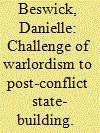

|
|
|
|
|
| Publication |
2009.
|
| Summary/Abstract |
Using evidence from the case of Congo, focusing in particular on the eastern Kivu provinces, this article argues that the enduring presence of warlords, and the influence of their international supporters, remains inadequately addressed by current practices of post-conflict state-building. The dominant contemporary model of state-building currently focuses on the promotion of liberal democracy as a way of avoiding future conflict, highlighting in particular the key role of elections. Simultaneously, it emphasises the importance of security and developing a state monopoly on violence. However, in the pursuit of both these ends in Congo, warlord politics and interference from regional powers continue to pose significant challenges. Exploring key aspects of the rebel movement led by Laurent Nkunda in east Congo (2004-2009), this article will illustrate some of the challenges warlordism poses in Congo, focusing particularly on the shortcomings of a 'single sovereign' approach to state-building. In conclusion, the experience of the Kivus indicates that an approach recognising multiple sovereignties or emphasising significant decentralisation may be more appropriate. Without such a shift in emphasis the notion that Congo is, or will soon become, an empirically functional state is perhaps wishful thinking.
|
|
|
|
|
|
|
|
|
|
|
|
|
|
|
|
| 2 |
ID:
089133


|
|
|
| 3 |
ID:
089139
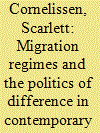

|
|
|
|
|
| Publication |
2009.
|
| Summary/Abstract |
The issue of migration and in particular the increase in irregular or undocumented migration has become highly politicised in Southern Africa. This has involved a rise in social intolerance towards migrant populations and outright xenophobia in many countries. This brief article examines the dynamics and complexities of migration in current-day Southern Africa and contextualises it in relation to the most salient issues, discourses and practices that characterise migration governance at the international level. The article highlights that predominant approaches to the governance of migration in the region reflect some of the dynamics which have marked migration discourse and praxis in the international sphere, but that they also carry some distinct characteristics. Trends of securitisation and related exclusionary practices of citizenship, which have become more pronounced in the international sphere, are emulated in Southern Africa. State and societal processes and reactions to higher levels of regional migration have created a context in which social polarisation and the entrenchment of difference prevails. This has meant that prime questions about how to ameliorate the socio-economic and political circumstances which evoke migrant flows in the first instance, and on how to deal with the inefficiencies in Southern Africa's current migration policies, have remained largely unasked by the region's rulers. Overall, Southern Africa's migration regime evidences two contradictory thrusts, one which seeks to encourage closer regional and specifically economic integration, and the other which resists the assumed threats posed to national sovereignty by increased migrant flows and which leads to a fractious regional governance system.
|
|
|
|
|
|
|
|
|
|
|
|
|
|
|
|
| 4 |
ID:
089136


|
|
|
|
|
| Publication |
2009.
|
| Summary/Abstract |
This article outlines the current situation with regard to the Lord's Resistance Army and the possibilities for peace in Northern Uganda. It seeks to add to the discourse on rethinking Africa's international relations in the context of a specific conflict and with regard to a specific tool of the international community: the International Criminal Court (ICC) and its involvement in issuing warrants for insurgency leaders in October 2005. The article discusses the role of traditional justice systems and the ICC in ending the war, concluding that justice in Northern Uganda requires an end to the false dichotomy of 'traditional' and ICC approaches and that the two must complement each other in order to address the different groups within the LRA and the Acholi population.
|
|
|
|
|
|
|
|
|
|
|
|
|
|
|
|
| 5 |
ID:
089140
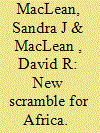

|
|
|
|
|
| Publication |
2009.
|
| Summary/Abstract |
At population levels, health outcomes are determined more by social conditions than by either biology or technological interventions. Therefore, entrenched and increasing inequalities associated with global transformations in political economy are among the most significant causal factors for so-called 'global health' problems that disproportionately afflict sub-Saharan Africans. Growing attention is being paid to the social causes of ill health, as evidenced in the WHO's recently introduced Commission on the Social Determinants of Health. However, the predominant paradigm continues to support a biotechnical/clinical health model that privileges pharmaceutical treatment of individual diseases over support for broader social change that would include improved broadly based national health systems as well as revised international economic structures. This paper examines the struggle involved in setting the normative framework for health in sub-Saharan Africa and the roles of major external actors in setting the policy agenda
|
|
|
|
|
|
|
|
|
|
|
|
|
|
|
|
| 6 |
ID:
089143
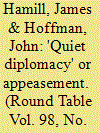

|
|
|
|
|
| Publication |
2009.
|
| Summary/Abstract |
This article offers a critical examination of South Africa's policy of 'quiet diplomacy' towards Zimbabwe since 2000, with the reasons behind it, especially the role of Thabo Mbeki, and considers possible alternatives. It argues that liberal values in Africa are usually prioritised at the abstract level in charters and declarations such as those of the African Union (AU), the Southern African Development Community (SADC), and the New Partnership for Africa's Development (NEPAD). The translation of such values into political practice has, however, become highly problematic, and they have frequently been eclipsed by other, more pressing, imperatives impinging upon the policy-making process. South African policy towards Zimbabwe since 2000, contend the authors, captures this paradox in stark relief.
|
|
|
|
|
|
|
|
|
|
|
|
|
|
|
|
| 7 |
ID:
089134
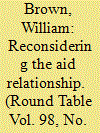

|
|
|
|
|
| Publication |
2009.
|
| Summary/Abstract |
Recent rhetoric surrounding the contemporary aid relationship between donors and African states is couched in terms of a high-level consensus between western and African political leaderships, a central pillar of which is adherence to liberal principles of governance and economic management. The paper argues that an analysis of the nature of this consensus and its prospects requires that we need to understand it as (1) encompassing specifically international-geopolitical dimensions (including state interests, bargaining and power); and (2) social-developmental purposes and content. The paper uses Rosenberg's considerations on 'international sociology' and uneven and combined development to provide a framework for analysing the aid relationship. In doing this, the paper speaks to two related theoretical issues: conceptualisations of the relationship between the 'social developmental' and the 'geopolitical/international' within International Relations (IR); and the contemporary relevance or otherwise of the discipline of IR to analyses of Africa's place in the international system
|
|
|
|
|
|
|
|
|
|
|
|
|
|
|
|
| 8 |
ID:
089135
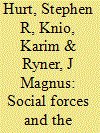

|
|
|
|
|
| Publication |
2009.
|
| Summary/Abstract |
This article addresses the consequences of Washington Consensus and more recently post-Washington Consensus policy for democratic good governance in Africa. It acknowledges the increased focus in recent years of policy-makers on poverty as an important force in world politics. Despite this increased concern the authors argue that International Relations as a discipline fails to offer a suitable framework for understanding poverty as a social force. The article proposes a revival of Robert W. Cox and Jeffrey Harrod's approach based on 'patterns of social relations of production'. This offers a disaggregation of the condition that is often referred to in the literature as 'the poor' or 'the informal sector'. The article then outlines a comparative research agenda based on the cases of Tunisia and South Africa. It demonstrates how these cases provide the sternest test for assessing the authors' scepticism of the prospects of reconciling market-led development with good governance, whilst also offering a 'most-different' comparison given their very different political cultures. In conclusion, the article reflects on the methodological aspects to operationalising such a research agenda and proposes an ethnographic approach informed by the work of Burawoy.
|
|
|
|
|
|
|
|
|
|
|
|
|
|
|
|
|
|
|
|
|